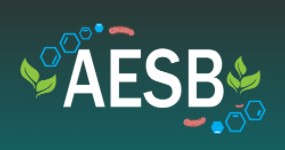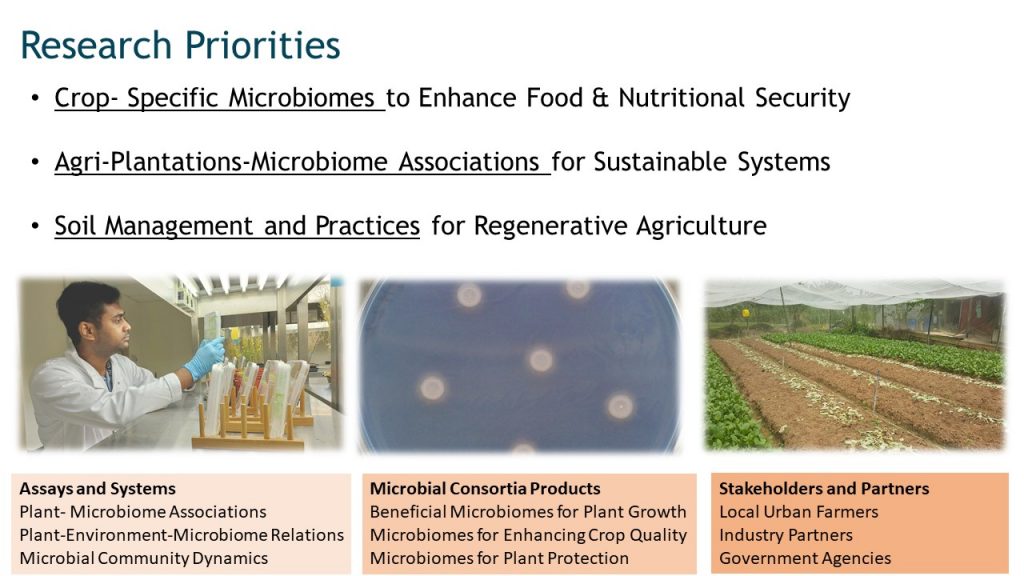
SANJAY SWARUP
Associate Professor
Contact Information:
Department of Biological Sciences
National University of Singapore
14 Science Drive 4
Singapore 117543
Additional Affiliations:
Director, NUS Environmental Research Institute (NERI) www.nus.edu.sg/neri
Director, Graduate Program & Deputy Director, Environmental Engineering Cluster | Singapore Centre for Environmental Life Sciences Engineering (SCELSE) | Nanyang Technological University | SBS-01n-15, 60 Nanyang Drive, Singapore 637551 | Tel: (65) 6316 2820 GMT+8h | Fax: (65) 6791 3856
6516 7933
6779 2486
dbsss@nus.edu.sg
Academic Qualifications
PhD UF (USA), PhD, Msc IARI, BSc PAU India
Agri-Environmental Systems Biology Group

Our group is interested to determine mechanistic basis of ecosystem functioning from molecular to organismal and landscape scales. We are interested to understand complex relationships in agro-ecosystems and environmental systems in order to provide transnational tools and explanations for policy and management decisions. We are taking a multidisciplinary approach by incorporating hydrology, robotics and AI, meta-genomics, metabolomics, computational, and high-resolution imaging to study these interesting biological systems.
Our group studies how microbial communities or “microbiomes” and their life on interfaces of solid, liquid or air as “biofilms” drive the processes occurring in natural environments such as surface freshwater or plant surfaces. Members of these species share resources such as metabolites or metabolic signals and they have diverse interactions with their hosts and immediate environments, all based on ecological principles.
We are taking a multidisciplinary approach by incorporating hydrology, meta-genomics, metabolomics, computational, and high-resolution imaging to study these interesting biological systems.

More details on on-going research themes are available on our website.
About the PI of the group – Sanjay Swarup
I am an agriculture and environmental biologist. Programs in my laboratory are shaped by my training in field-based themes of plant breeding and plant pathology combined with lab-based training in molecular biology. Through these programs, we have built the capability to understand complex environmental systems and provide meaningful solutions that can be translated.
I have co-authored more than 90 peer-reviewed publications in journals of international repute. I have been invited to share our research findings at leading international conferences. My h-index is 25 and our work has received attention from local/regional and international scientific community. I serve on several editorial boards and professional societies. I contribute actively towards pushing the frontiers in the field and organize focus group workshops, sharing sessions and other events for young researchers. I am a consultant for several multi-national companies working in agri-tech space.
I am the principal investigator for a multi-disciplinary project on improving crop production for green leafy vegetables supported by Competitive Research Programme under National Research Foundation. Apart from this, I have received support from other funding agencies for evaluating microbiome potential for alternate protein sources as well developing smart farming solutions for nutritious, high-quality crops
Selected Publications
-
Bandla, A., Akhtar, H., Lupascu, M., Sukri, R. S., & Swarup, S. (2024). Elevated methane flux in a tropical peatland post-fire is linked to depth-dependent changes in peat microbiome assembly. npj Biofilms and Microbiomes, 10(1), 8.
-
Hooijer, A., Vernimmen, R., Mulyadi, D. et al.Benefits of tropical peatland rewetting for subsidence reduction and forest regrowth: results from a large-scale restoration trial. Sci Rep 14, 10721 (2024). https://doi.org/10.1038/s41598-024-60462-3
-
Verrone, V., Gupta, A., Laloo, A.E., Dubey, R.K., Hamid, N.A.A., Swarup, S., 2024. Organic matter stability and lability in terrestrial and aquatic ecosystems: A chemical and microbial perspective. Science of The Total Environment 906, 167757. https://doi.org/10.1016/j.scitotenv.2023.167757
-
News and View paper: Raza, W., & Jiang, G. (2024). Root volatiles manipulate bacterial biofilms. Nature Ecology & Evolution. https://doi.org/10.1038/s41559-024-02403-x
-
NCB paper: Kulkarni, O. S., Mazumder, M., Kini, S., Hill, E. D., Aow, J. S., Phua, S. M., Elejalde, U., Kjelleberg, S., & Swarup, S. (2023). Volatile methyl jasmonate from roots triggers host-beneficial soil microbiome biofilms. Nature Chemical Biology, 20(4), 473–483. https://doi.org/10.1038/s41589-023-01462-8
-
Mukherjee A, Tikariha H, Bandla A, Pavagadhi S, Swarup S. 2023. Global analyses of biosynthetic gene clusters in phytobiomes reveal strong phylogenetic conservation of terpenes and aryl polyenes. mSystems 8:e00387-23.
-
Omkar S. Kulkarni, Mrinmoy Mazumder, Shruthi Kini, Eric D. Hill, Johanan Shao Bing Aow, Samantha Mun Lin Phua, Untzizu Elejalde, Staffan Kjelleberg & Sanjay Swarup (2023). Volatile methyl jasmonate from roots triggers host-beneficial soil microbiome biofilms. Nature Chemical Biology. Altmetrics: >9,500 accesses since 13 Nov 2023; this article is in the 97th percentile of the 308,000 tracked articles of a similar age in all journals.
-
Zhu, J., Tan, W. K., Song, X., Zhang, Z., Gao, Z., Wen, Y., Omg C.N., Swarup, S & Li, J. (2022). Synthesis and Characterization of Okara-Poly (acrylic acid) Superabsorbent Hydrogels for Enhancing Vegetable Growth through Improving Water Holding and Retention Properties of Soils. ACS Food Science & Technology
-
Mohanty, B., Majedi, S. M., Pavagadhi, S., Te, S. H., Boo, C. Y., Gin, K. Y. H., & Swarup, S. (2022). Effects of Light and Temperature on the Metabolic Profiling of Two Habitat-Dependent Bloom-Forming Cyanobacteria. Metabolites, 12(5), 406.
-
Abdul. -Wahab, M. F., Pavagadhi, S., Tikariha, H., & Swarup, S. (2022). Microbiome Engineering for Next-Generation Precision Agriculture. Principles in Microbiome Engineering, 137-153.
-
Ooi, Q. E., Nguyen, C. T. T., Laloo, A., Bandla, A., & Swarup, S. (2022). Urban Soil Microbiome Functions and Their Linkages with Ecosystem Services. In Soils in Urban Ecosystem (pp. 47-63). Springer, Singapore.
-
Pavagadhi, S., Benke, P. I., Majedi, S. M., Umashankar, S., Yeap, Y. T., & Swarup, S. (2022). Evaluating the effects of environmental perturbations in bloom forming cyanobacteria through untargeted metabolomics. In Applied Environmental Metabolomics (pp. 231-244). Academic Press.
-
Durr, J., Reyt, G., Spaepen, S., Hilton, S., Meehan, C., Qi, W., Takehiro Kamiya, Paulina Flis, Hugh G Dickinson, Attila Feher, Shivshankar, U., Pavagadhi, S., Swarup, S., David Salt, Gary D Bending, Jose Gutierrez-Marcos. (2021) A Novel Signaling Pathway Required for Arabidopsis Endodermal Root Organization Shapes the Rhizosphere Microbiome, Plant and Cell Physiology, 62 (2), 248–261.
-
Mishra, R., Koay, T.B., Chitre, M., Swarup, S. (2021) Multi-USV Adaptive Exploration Using Kernel Information and Residual Variance. Front Robot AI. 28 (8), 572243.
-
Tikariha, H., Pavagadhi, S., Mayalagu, S., Poh, MCP., Swarup, S. (2021) Hybrid Genome Assembly for Predicting Functional Potential of a Novel Streptomyces Strain as Plant Biomass Valorisation Agent. Indian Journal of Microbiology (accepted).
-
Bandla, A., Pavagadhi, S., Sudarshan, A., Poh, MCH. (2020). 910 metagenome-assembled genomes from the phytobiomes of three urban-farmed leafy Asian greens. Scientific Data,7 (1), 278.
-
Pavagadhi, S., & Swarup, S. (2020). Metabolomics for evaluating flavor-associated metabolites in plant-based products. Metabolites, 10(5).
-
Keyu, G., Pavagadhi, S., Yoon Ting, Y., Cheng-Yen C., Swarup, S., & Naqvi, N.I. (2020). Crosskingdom growth benefits of fungus-derived phytohormones in Choy Sum. BioRxiv.
-
Mishra, S., Yi, Y. P., Shivshankar, U., Moses, D., & Idris, A. (2020). Developing Sustainable Practices to Mitigate Impacts of Climate Change on Natural and Managed Tropical Peatlands. 15th International Congress of Peat Society, 416.
-
Jing ling, Z., Xia Song, Wee Kee, T., Yuting, W., Zhengyang, G., Choon Nam, O., Chiang Shiong, L., Swarup, S., & Jun, L. (2020). Modification of Biomass Okara Using Poly (acrylic acid) through Free-radical Graft Polymerization. Journal of Agricultural and Food Chemistry. 68(46), 13241-13246.
-
Rachelle, E.B., Bandla, A., Swarup, S., & Krassimira, H. (2020). Freshwater Sediment Microbial Communities Are Not Resilient to Disturbance from Agricultural Land Runoff. Frontiers in Microbiology. 11, 2552.
-
Saxena, G., Eric, D.H., Ezequiel, M. M., Shivshankar, U., Jun Wei, T., Wei Woo, Y., Peter, D.S., Veronica, B.R., Staffan, K., Rohan, B.H.W., Stefan, W., & Swarup, S. (2020). Integrative systems approach reveals dynamics of microbiome-metal-ion axis in mesocosms representing tropical urban freshwater canal ecosystem. BioRxiv.
-
Pavagadhi, S., Bandla, A., Miko, P.C.H., Umashankar, S., Yoon Ting, Y., & Swarup, S. (2019). Host developmental stage is associated with shifts in the exosphere microbiome of urban-farmed Asian green leafy vegetables. BioRxiv.
-
Pinu, F. R., Beale, D. J., Paten, A. M., Kouremenos, K., Swarup, S., Schirra, H. J., & Wishart, D. (2019). Systems biology and multi-omics integration: Viewpoints from the metabolomics research community. Metabolites, 9(4).
-
Nur, A.A.H., Faridah, A., Maulidiani, M., Intan S.I., Chau Ling, T., Swarup, S., & Shivshankar, U. (2019). NMR metabolomics for evaluating passage number and harvesting effects on mammalian cell metabolome. Analytical Biochemistry, 576, 20-32.
-
Bandla, A., Saxena, G., Mishra, R., & Swarup, S. (2019). A Framework to Address the Food, Energy and Water Nexus among Indian Megacities and Their Rapidly Expanding Peripheries. Dialogue – Science. Scientists. Society, Indian Academy of Sciences.10.29195/DSSS.02.01.0019.
-
Pavagadhi, S., & Swarup, S. (2019). Research Article: Advances in Science. A special issue on Agri-food sciences: From the farm to the plate. Advances in Science, 24(1).
-
Pan, D., Pavagadhi, S., Umashankar, S., Rai, A., Benke, P. I., Rai, M., & Swarup, S. (2019). Resource partitioning strategies during toxin production in Microcystis aeruginosa revealed by integrative omics analysis. Algal Research, 42.
-
Nur, A.A.H., Faridah, A., Intan S.I., Chau Ling, T., Maulidiani, M., Ahmed, M., Swarup, S., & Umashankar, S. (2019). 1H-NMR-based metabolomics to investigate the effects of Phoenix dactylifera seed extracts in LPS-IFN-γ-induced RAW 264.7 cells. Food Research International, (125).
-
Abdul-Hamid, N. A., Abas, F., Ismail, I. S., Tham, C. L., Maulidiani, M., Mediani, A., & Zolkeflee, N. K. Z. (2019). Metabolites and biological activities of Phoenix dactylifera L. pulp and seeds: A comparative MS and NMR based metabolomics approach. Phytochemistry Letters, 31, 20–32.
-
Jackson, T., Sayantan, S., Shiguo Jia, J.S. R., Shailendra, M., Sudiana, I.M., Swarup, S., Choon Nam, Ong., & Liya, E.Y. (2019). Impacts of peat-forest smoke on urban PM2.5 in the Maritime Continent during 2012–2015: Carbonaceous profiles and indicators. Environmental Pollution, 248, 496-505.
-
Keogh, D., Lam, L. N., Doyle, L. E., Matysik, A., Pavagadhi, S., Shivshankar, U., & Swarup, S. (2019). Erratum: Correction for Keogh D., Extracellular Electron Transfer Powers Enterococcus faecalis Biofilm Metabolism. MBio, 10(3).
-
Mishra, R., Chitre, M., & Swarup, S. (2018). Online informative path planning using sparse Gaussian processes. In OCEANS – MTS/IEEE Kobe Techno-Oceans, OCEANS – Kobe.
-
Mishra, R., Chitre, M., & Swarup, S. (2018). Informed Sampling and Adaptive Monitoring using Sparse Gaussian Processes. In AUV – IEEE/OES Autonomous Underwater Vehicle Workshop, Proceedings.
-
Liu, Y., Zhang, H., Umashankar, S., Liang, X., Lee, H. W., Swarup, S., & Ong, C.N. (2018). Characterization of plant volatiles reveals distinct metabolic profiles and pathways among 12 brassicaceae vegetables. Metabolites, 8(4).
-
Birrer, S.C., Dafforn, K.A., Sun, M.Y., Williams, R.B.H., Potts, J., Scanes, P., Swarup, S., & Johnston, E.L. (2019). Using meta-omics of contaminated sediments to monitor changes in pathways relevant to climate regulation. Environmental Microbiology, 21(1), 389–401.
-
Balan, P., Chong, Y. S., Umashankar, S., Swarup, S., Loke, W. M., Lopez, V., & Seneviratne, C. J. (2018). Keystone species in pregnancy gingivitis: A snapshot of oral microbiome during pregnancy and postpartum period. Frontiers in Microbiology, 9.
-
Balan, P., Chong, Y. S., Umashankar, S., Swarup, S., Loke, W. M., Lopez, V., & Seneviratne, C. J. (2018). Keystone species in pregnancy gingivitis: A snapshot of oral microbiome during pregnancy and postpartum period. Frontiers in Microbiology, 9.
-
Vello, V., Umashankar, S., Phang, S.M., Chu, W.L., Lim, P.E., Nazia, A.M., Liew, K., Swarup, S., & Chew, F.T. (2018). Metabolomic profiles of tropical Chlorella and Parachlorella species in response to physiological changes during exponential and stationary growth phase. Algal Research, 35, 61–75.
-
Saxena, G., Mitra, S., Marzinelli, E. M., Xie, C., Wei, T.J., Steinberg, P.D., Williams, R.B.H., Kjelleberg, S., Lauro, F. M., & Swarup, S. (2018). Metagenomics reveals the influence of land use and rain on the benthic microbial communities in a tropical urban waterway. MSystems, 3(3).
-
Keogh, D., Lam, L.N., Doyle, L.E., Matysik, A., Pavagadhi, S., Umashankar, S., Dale, J.L., Song, Y., Boothroyd, C.B., Dunny, G.M., Swarup, S., Williams, R.B.H., & Kline, K.A. (2018). Extracellular electron transfer powers Enterococcus faecalis biofilm metabolism. MBio, 9(2).
-
Chua, S. L., Ding, Y., Liu, Y., Cai, Z., Zhou, J., Swarup, S., Daniela, I.M., Stephan, C.S., Staffan, K., Michael, G., & Yang, L. (2017). Erratum: Correction to Reactive oxygen species drive evolution of pro-biofilm variants in pathogens by modulating cyclic-di-GMP levels. Open Biology, 7(9).
-
[27] Suriyanarayanan, T., Seneviratne, C.J., W.L. Ng, Pavagadhi, S., & Swarup, S. (2017). Metabolomics of Microbial Biofilms: Current Status and Future Directions. Microbial Biofilms, 7(30).
-
Teh, B.T., Lim, K., Yong, C.H., Ng, C.C.Y., Rao, S.R., Rajasegaran, V., Lim, W.K., Ong, C.K., Chan, K., Cheng, V.K.Y., Soh P. S., Swarup S., Rozen S.G., Nagarajan, N., & Tan, P. (2017). The draft genome of tropical fruit durian (Durio zibethinus). Nature Genetics, 49(11).
-
Seneviratne, C. J., Suriyanarayanan, T., Swarup, S., Chia, K. H. B., Nagarajan, N., & Zhang, C. (2017). Transcriptomics Analysis Reveals Putative Genes Involved in Biofilm Formation and Biofilm-associated Drug Resistance of Enterococcus faecalis. Journal of Endodontics, 43(6), 949–955.
-
Ling, H., Foo, J.L., Saxena, G., Swarup, S., & Chang, M.W. (2017). Drug Targeting of the Human Microbiome. Systems Biology, 7.
-
Rai, A., Umashankar, S., Rai, M., Kiat, L. B., Bing, J. A. S., & Swarup, S. (2016). Coordinate regulation of metabolite glycosylation and stress hormone biosynthesis by TT8 in Arabidopsis. Plant Physiology, 171(4), 2499–2515.
-
Chua, S. L., Ding, Y., Liu, Y., Cai, Z., Zhou, J., Swarup, S., Drautz-Moses, D.I., Schuster, S.C., Kjelleberg, S., Givskov, M., & Yang, L. (2016). Reactive oxygen species drive evolution of pro-biofilm variants in pathogens by modulating cyclic-di-GMP levels. Open Biology, 6(11).
-
Suriyanarayanan, T., Periasamy, S., Lin, M.H., Ishihama, Y., & Swarup, S. (2016). Flagellin FliC phosphorylation affects type 2 protease secretion and biofilm dispersal in Pseudomonas aeruginosa PAO1. PLoS ONE, 11(10).
-
Fazi, S., Bandla, A., Pizzetti, I., & Swarup, S. (2016). Microbial biofilms as one of the key elements in modulating ecohydrological processes in both natural and urban water corridors. Ecohydrology and Hydrobiology, 16(1), 33–38. 2015
-
Ravichandran, A., Ramachandran, M., Suriyanarayanan, T., Wong, C. C., & Swarup, S. (2015). Global regulator MorA affects virulence-associated protease secretion in Pseudomonas aeruginosa PAO1. PLoS ONE, 10(4).
-
Mynampati, K. C., Lee, Y. J., Wijdeveld, A., Reuben, S., Samavedham, L., Kjelleberg, S., & Swarup, S. (2015). RhizoFlowCell system reveals early effects of micropollutants on aquatic plant rhizosphere. Environmental Pollution, 207, 205–210.
-
Patkar, R. N., Benke, P. I., Qu, Z., Chen, Y. Y. C., Yang, F., Swarup, S., & Naqvi, N. I. (2015). A fungal monooxygenase-derived jasmonate attenuates host innate immunity. Nature Chemical Biology, 11(9), 733–740.
-
Saxena, G., Marzinelli, E. M., Naing, N. N., He, Z., Liang, Y., Tom, L., Ping, H., Josh, U.M., Reuben, S., Mynampati, K.C., Mishra, S., Umashankar, S., Mitra, S., Andersen, G., Kjelleberg, S., & Swarup, S. (2015). Ecogenomics reveals metals and land-use pressures on microbial communities in the waterways of a megacity. Environmental Science and Technology, 49(3), 1462–1471.
-
Benke, P. I., Vinay Kumar, M. C. S., Pan, D., & Swarup, S. (2015). A mass spectrometry-based unique fragment approach for the identification of microcystins. Analyst, 140(4), 1198–1206.
-
Mishra, S., Lee, W. A., Hooijer, A., Reuben, S., Sudiana, I. M., Idris, A., & Swarup, S. (2014). Microbial and metabolic profiling reveal strong influence of water table and land-use patterns on classification of degraded tropical peatlands. Biogeosciences, 11(7), 1727–1741.
-
Reuben, S., Banas, K., Banas, A., & Swarup, S. (2014). Combination of synchrotron radiation-based Fourier transforms infrared microspectroscopy and confocal laser scanning microscopy to understand spatial heterogeneity in aquatic multispecies biofilms. Water Research, 64, 123–133.
-
Reuben, S., Rai, A., Pillai, B. V. S., Rodrigues, A., & Swarup, S. (2013). A bacterial quercetin oxidoreductase quoa-mediated perturbation in the phenylpropanoid metabolic network increases lignification with a concomitant decrease in phenolamides in arabidopsis. Journal of Experimental Botany, 64(16), 5183–5194.
-
Nagarajan, K., Loh, K.-C., & Swarup, S. (2013). Bioinformatics and molecular biology for the quantification of closely related bacteria. Applied Microbiology and Biotechnology, 97(14), 6489–6502.
-
Qian, C., Ching Wong, C., Swarup, S., & Chiama, K.-H. (2013). Bacterial tethering analysis reveals a ‘run-reverse-turn’ mechanism for pseudomonas species motility. Applied and Environmental Microbiology, 79(15), 4734–4743.
-
Reuben, S., Chua, C. L. N., Fam, K. D., Thian, Z. Y. A., Kang, M. K., & Swarup, S. (2012). Bacterial diversity on different surfaces in urban freshwater. Water Science and Technology, 65(10), 1869–1874.
-
Zhang, W. C., Ng, S.-C., Yang, H., Rai, A., Umashankar, S., Ma, S., Soh, B.S., Sun, L.L., Tai, B.C., Nga, M.E., Bhakoo, K.K., Jayapal, S.R., Nichane, M., Yu, Q., Ahmed, D.A., Tan, C., Sing, W.P., Tam, J., Thirugananam, A., Noghabi, M.S., Pang, Y.H., Ang, H.S., Mitchell, W., Robson, P., Kaldis, P., Soo, R.A., Swarup, S., Lim, E.H., Lim, B. (2012). Glycine decarboxylase activity drives non-small cell lung cancer tumor-initiating cells and tumorigenesis. Cell, 148(1–2), 259–272. 2011
-
Biswas, A., Rao, R., Umashankar, S., Mynampati, K. C., Reuben, S., Parab, G., & Swarup, S. (2011). datPAV-an online processing, analysis and visualization tool for exploratory investigation of experimental data. Bioinformatics, 27(11), 1585–1586.
Book chapter
2020
[1] Bandla, A., Pavagadhi, S., & Swarup, S. (2020). Harnessing Soil Microbiomes for Creating Healthy and Functional Urban Landscapes. Soil Analysis: Recent Trends and Applications, 325–338.
Conference 2019
[1] Saxena, G., Pavagadhi, S., & Swarup, S. (2019). Live- Exudation Assisted Phytobiome Culturing System (LEAP-CS) to characterize metabolic, molecular, and physiological phenotypes. miCROPe. 2-5 December, Vienna, Austria.
[2] Pan, D., Pavagadhi, S., Umashankar, S., Rai, A., Benke, P.I., Rai, M., Saxena, G., Gangu, V., & Swarup, S. (2019). Integrative omics analysis reveals resource partitioning strategies during toxin production in Microcystis aeruginosa. Metabolomics, 23-27 June, Hague.
[3] Saxena, G., Liang, Y., Pavagadhi, S., Miko, P.C.H., Yoon Ting, Y., & Swarup, S. (2019). A novel plant-microbiome co-culturing system reveals key associations of specific metabolites with plant growth and stress tolerance. Metabolomics, 23-27 June, The Hague (keynote presentation).
[4] Akhtar, H., Lupascu, M., Pavagadhi, S., Miko, P.C.H., N. Bisht, R. S. Sukri, Smith, E. L. Thomas, R.A.C., & Swarup, S. (2019). Effects of post-fire vegetation structure on CH4 emissions from a degraded tropical peatland in Brunei. Geophysical Research Abstracts, 21(1).
